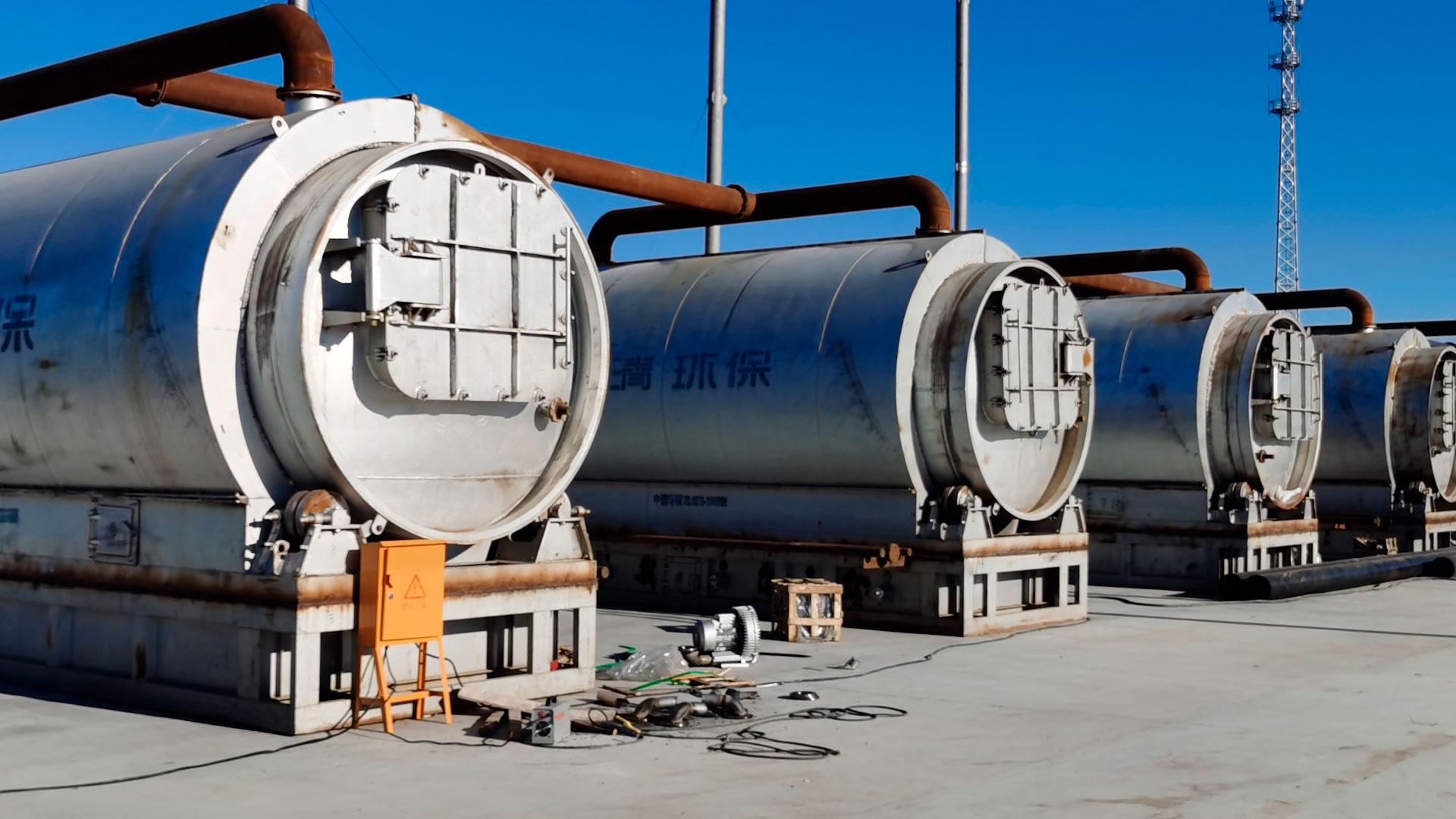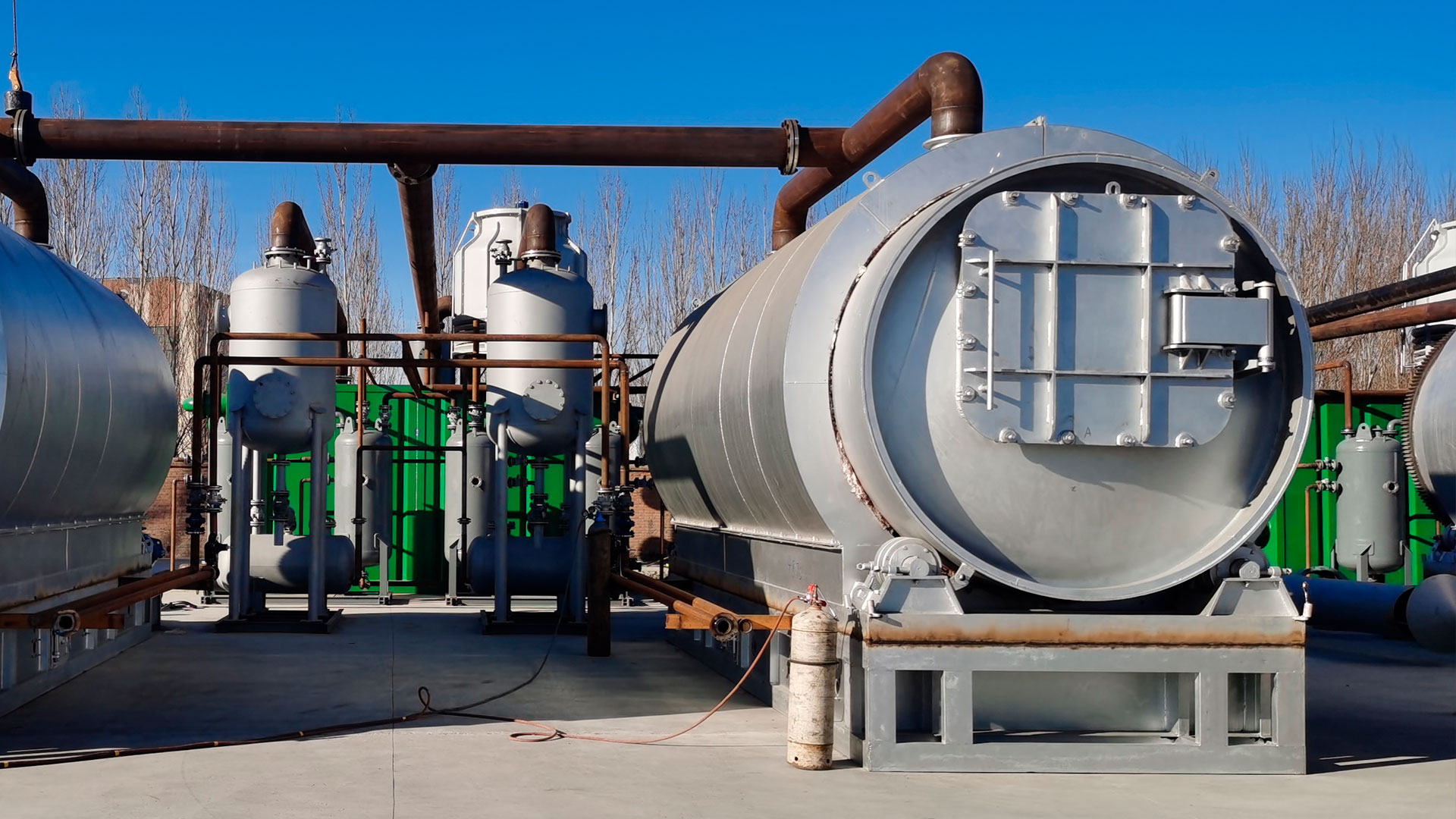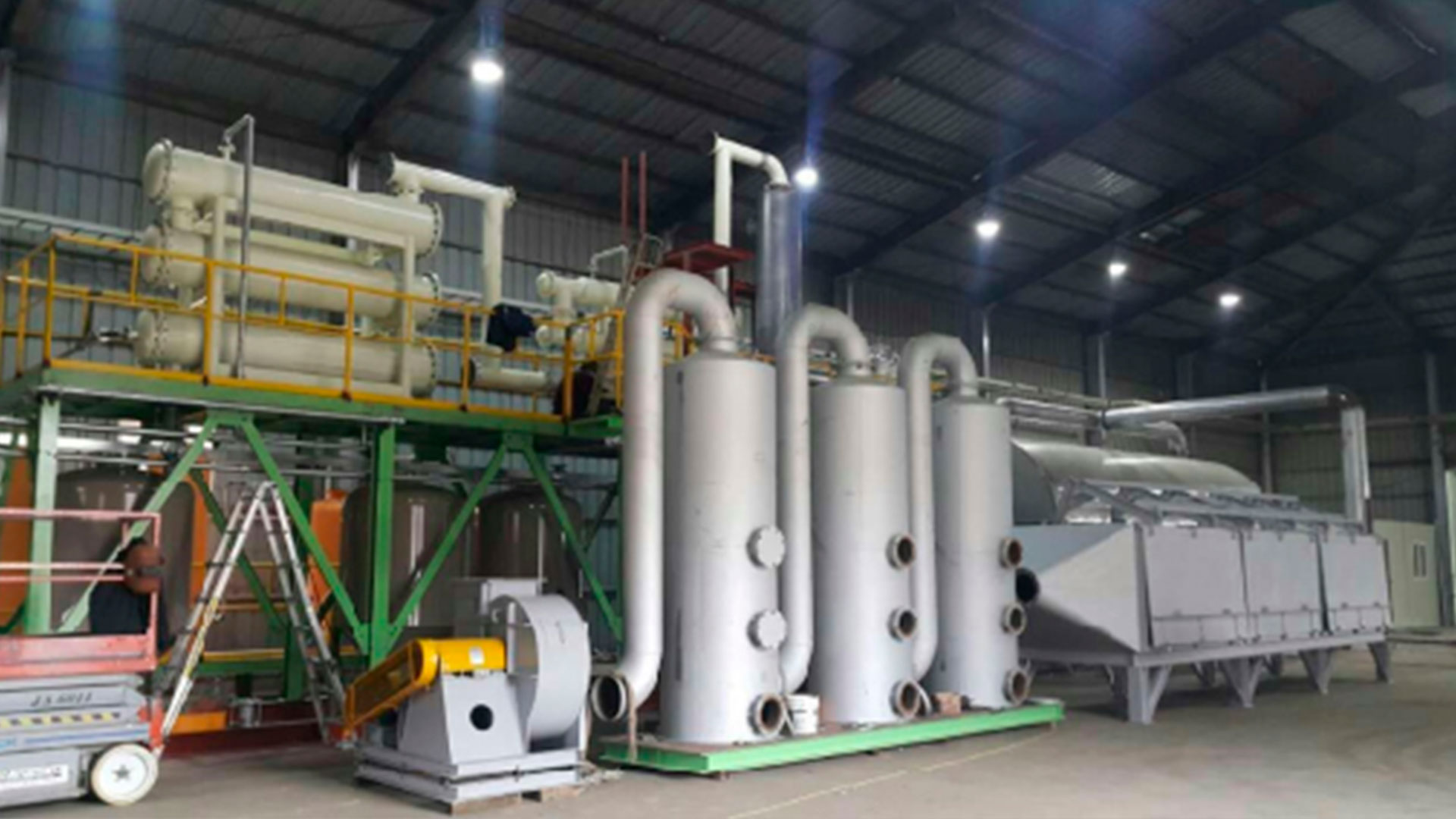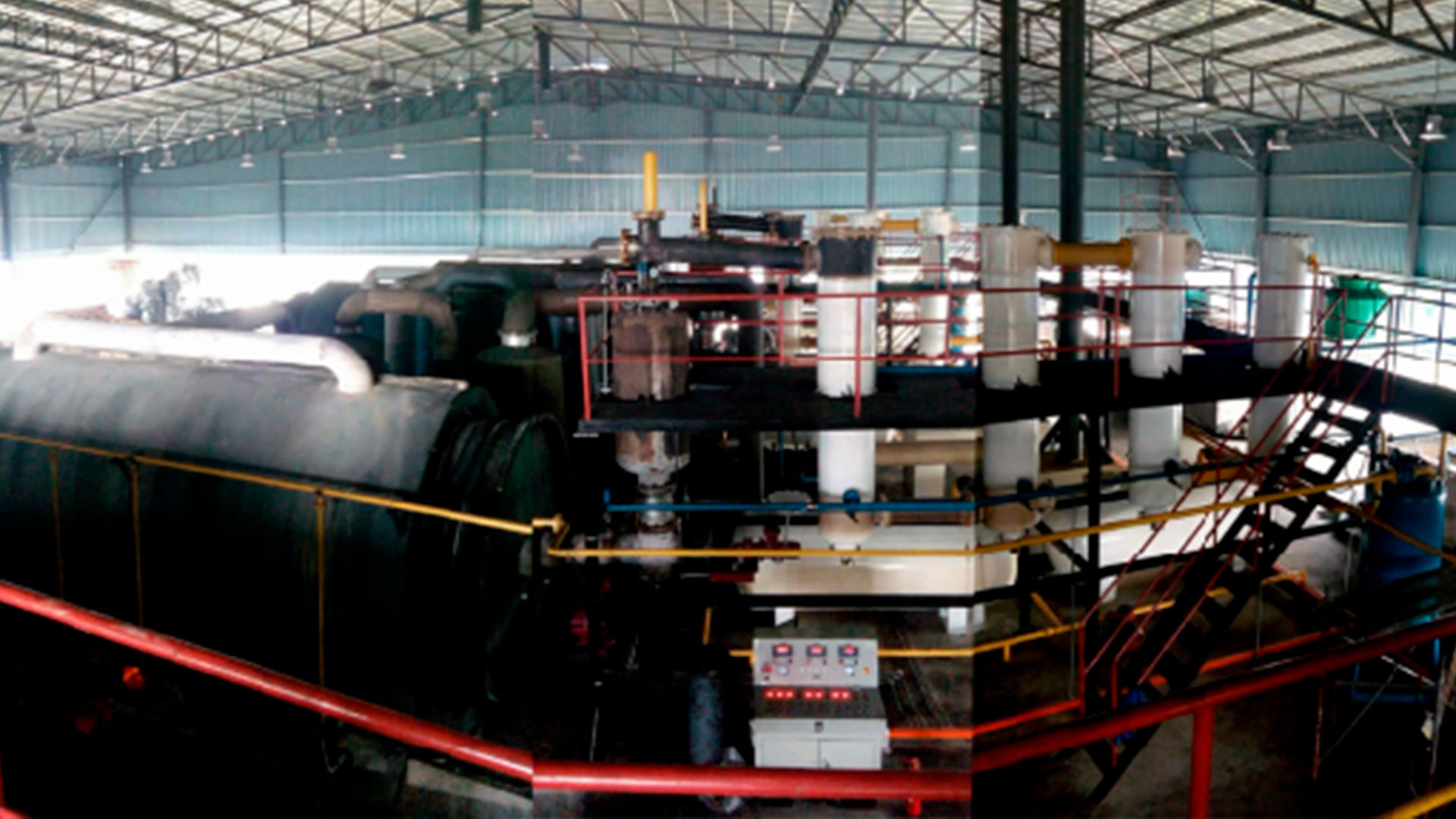

This plant is a versatile Solid Waste Processor that, through the PYROLYSIS process, performs the degradation of matter at a constant temperature of 400 degrees Celsius in an advanced technology reactor.
In the same process, the plant generates Bio Diesel, Bio Charcoal (Charcoal black) and Gas, a part of the Gas generated is reprocessed and reused in the reactor for self-consumption, thus autonomously managing the energy it requires to operate.
The pyrolysis process in our equipment begins at a constant temperature of 400 degrees Celsius, from this temperature the materials completely degrade, gradually turning into Bio Diesel, Bio Coal and Gas, processing 50 tons of garbage per session at a time. Approximately between 16 and 18 hours, generating a high production yield of Bio Diesel (10%) and Bio Coal (85%), the Gas produced is managed autonomously for its next session and in the event of a surplus of Gas ( methane and carbon dioxide), can be stored or burned to avoid greenhouse gas pollution that affects the ozone.
Its great cooling capacity after the extraction of Bio Diesel and Bio Carbon, offers the possibility of starting the waste recharge process quickly (approximately one hour) to start a new session. This greatly reduces plant downtime, improving turnaround times.
Its advanced engineering in the smoke scrubbers reduce environmental pollution, complying with the standards of the European Union and, in turn, the discharge of the Bio Carbon sealed at high temperature, avoids the contamination of the bio carbon.
The pollution reduction compared to a sanitary landfill is approximately 97%, optimizing the use of clean fuels and energies, effectively reducing the environmental impact.

Ultrasonic welding technology offers the fundamental advantage of working without adhesives, without joining elements or solvents, so that its application is especially ecological and profitable.
Ultrasonic welding involves an acoustic tool that generates high-frequency sound waves. In doing so, the pieces to be joined are subjected to vibration and generate heat on the contact surface by friction, so that they merge and bind to each other.
Technical Standards and Tests
The equipment we distribute is extensively tested to ensure total quality and safety.
Before leaving the factory, the equipment is subjected to welding tests, penetrating liquid tests, operation test, equipment sizing inspection, among others. All tests are supervised by a technical team headed by a mechanical engineer who certifies the equipment and quality compliance.





The Biodiesel Plant is machinery with state-of-the-art technology that allows the treatment of urban solid waste, to convert it into gas, biodiesel and biochar. It has a maximum treatment capacity of 50 tons of urban solid waste per day distributed in 3 shifts of 6 hours.
The equipment is designed in order to have complete "thermal and acoustic" insulation between the outside and the inside.
The oven has a total isolation system, so that it can be operated without the use of personal protective equipment.
1. Residue recolection.
2. They are crushed and a reactor is fed with them. In this reactor, the material is pyrolyzed at a constant temperature of 400° Celsius and will gradually be converted into gas, biodiesel and biochar.
3. The gas, biodiesel and biochar are separated and cooled, then they go through a washing process and are stored in their respective collector.
4. The gas is led to the combustion chamber for the operation of the plant.
5. The next phase is the extraction of biodiesel and biochar for storage.
6. The smoke resulting from the process will be conducted to the scrubber, which converts it into a contamination-free white gas and is expelled through the chimney.
7. Biodiesel can be used as fuel to generate electricity.
8. Bio charcoal can be used as fertilizer.
Conveyor belt for the collected material.
Material receiving hopper.
Reactor with capacity to process 3.0 m3 of Urban Solid Waste per hour.
Gas separator.
Gas washing system.
Gas collector.
Moisture condensation system.
Biodiesel collector.
Smoke scrubber.
Generator with the capacity to operate the various electrical equipment.
Biochar storage and disposal system.
General control panels of the equipment and remote control.
Safety valves to prevent possible accidents.
Our plants generate: gas for their operation, biodiesel for sale, self-consumption in their own vehicles or for use as fuel in the generation of electricity, biochar that can be used as fertilizer, offering a direct improvement to the environment which, unlike from other solutions, it offers the following benefits: SELF-SUSTAINABILITY, SAVINGS and HIGH PRODUCTIVITY.
1. It generates gas for its operation.
2. It generates biodiesel for sale or self-consumption in its own vehicles or as fuel in the generation of electricity.
3. Generates biochar for sale as fertilizer.
4. Improves the Government Image by taking initiative in a global problem.
5. Direct improvement in the environment and health due to the efficiency of your reactor. does not contaminate aquifers, complies with the SGS-AIR ANALYSIS standard of the Union. European, and does not contribute to cancerous diseases like the traditional landfill.
1. Land extensions.
2. Staff.
3. Operating expenses.
4. Installations.
5. Exponential increase in confinement capacity.
6. Transforms into 100% reusable ecological by-products.
1. Stationary operation.
2. It processes 50 tons of garbage in 24 hours in 6-hour shifts with a two-hour break between intervals.
3. It processes Solid Urban Waste and Infectious Biological Waste.
4. Gas: 2,500 m3 per module. Zero fuel cost. The consumption of the "Plant" is fed by the GAS itself generated.
5. Diesel: 5,000 liters per module.
6. Energy - megawatts (Container): 1.5 megawatts per hour.
7. Lubricants and washing: 40% reduction in spending on consumables.
8. Mortal ashes: 270 Kg per Turn.